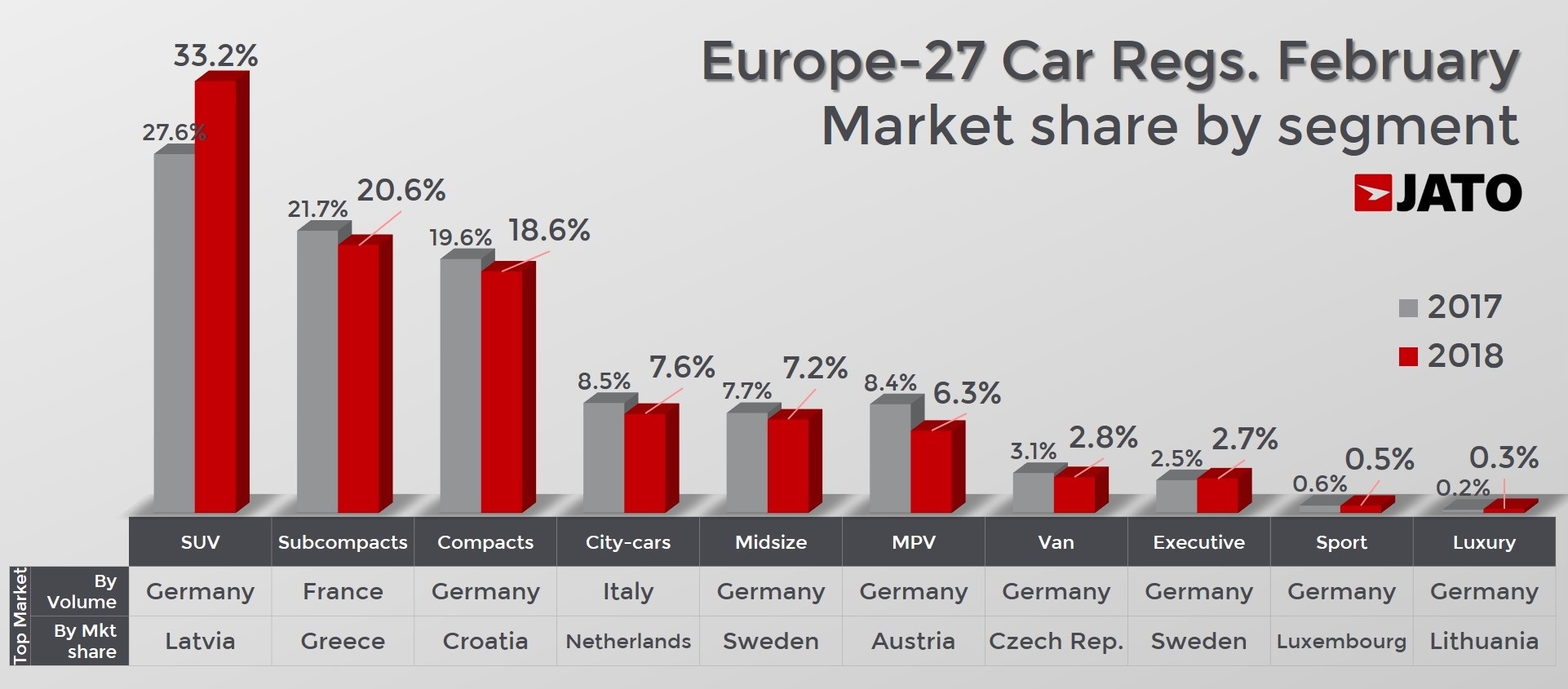New Car Registrations In Europe Plummet Due To Economic Woes

Table of Contents
The Impact of Inflation and Rising Interest Rates on Car Purchasing
The rising cost of living is a major obstacle to purchasing a new car. Inflation across Europe has driven up prices for everything from food to fuel, significantly impacting consumer purchasing power. Coupled with this, interest rates have climbed sharply, making car loans considerably more expensive and less accessible.
- Increased Loan Costs: Higher interest rates translate to larger monthly payments and a higher overall cost for financing a vehicle. This makes car ownership a less attractive proposition for many potential buyers.
- Diminished Consumer Confidence: As inflation erodes savings and disposable income, consumer confidence plummets. People are less likely to make significant purchases like new cars when facing economic uncertainty.
- Country-Specific Impacts: Southern European countries, already grappling with high unemployment and debt, are particularly hard-hit, experiencing some of the steepest declines in new car registrations. For example, [Insert data on specific country with significant decline in car sales]. Interest rates in [Country example] have increased by [percentage]% in the last year, significantly impacting affordability.
Energy Crisis and Supply Chain Disruptions
The ongoing energy crisis in Europe is compounding the problem. Increased energy costs directly impact car manufacturing, leading to higher production costs and impacting the overall availability of vehicles.
- Increased Manufacturing Costs: The surge in energy prices increases the cost of electricity, fuel, and other essential resources required for car production. This added expense is often passed on to consumers, further reducing affordability.
- Supply Chain Bottlenecks: The energy crisis has disrupted supply chains, delaying the delivery of essential components and raw materials. This has led to production delays and further limited the availability of new cars.
- Semiconductor Shortage: The global semiconductor shortage continues to plague the automotive industry, creating further bottlenecks in car production. Major manufacturers are still struggling to secure sufficient chips to meet demand. [Mention specific examples of manufacturers facing delays].
Recession Fears and Consumer Sentiment
The looming threat of a recession is casting a long shadow over consumer spending. Individuals and families are tightening their belts, postponing large purchases like new cars until economic uncertainty abates.
- Declining Consumer Confidence Indices: Major economic indicators, such as consumer confidence indices, are showing a downward trend across Europe, reflecting a pessimistic outlook and reduced willingness to spend. [Include specific data points from reputable sources].
- Impact on Market Segments: The impact is felt across all segments of the car market, but budget-conscious buyers are particularly affected. Luxury car sales are also declining, though perhaps at a slower rate.
- Shift in Priorities: Consumers are prioritizing essential spending over discretionary purchases, leading to a decline in demand for new vehicles.
Government Policies and Incentives (or lack thereof)
Government policies play a crucial role in stimulating or dampening car sales. While some European countries offer incentives to encourage the adoption of electric vehicles, the overall effectiveness of these measures in offsetting the impact of economic woes remains debatable.
- Varying Approaches Across Europe: Different European countries have adopted different approaches, ranging from tax breaks and subsidies to scrapping schemes. [Compare policies from two or three contrasting countries].
- Effectiveness of Existing Incentives: The effectiveness of current incentives is debatable, as the overall decline in new car registrations suggests they haven't been enough to counter the negative economic impacts.
- Need for New Policies: Many argue that more substantial and targeted measures are needed to revitalize the European car market and support the automotive industry.
The Future Outlook for New Car Registrations in Europe
Predicting the future of the European car market is challenging, but several factors will likely influence its trajectory.
- Market Forecast: Analysts foresee continued challenges in the short term, with new car registrations likely remaining depressed until economic conditions improve. [Cite reputable forecasts].
- Potential Recovery Scenarios: A recovery will depend on factors such as inflation rates, interest rate adjustments, and consumer confidence. A significant economic upturn would be crucial.
- Technological Shifts: The transition to electric vehicles is expected to continue, but the pace might be slower than initially projected given current economic headwinds.
Conclusion: Navigating the Storm: Understanding the Plummet in New Car Registrations in Europe
The sharp decline in new car registrations in Europe is a clear reflection of the significant economic challenges facing the continent. Inflation, rising interest rates, the energy crisis, recession fears, and a lack of sufficient government intervention have created a perfect storm that is battering the automotive industry. While the short-term outlook remains uncertain, understanding these underlying economic factors is crucial for navigating this turbulent period. Stay informed about the evolving situation in the European car market and the ongoing impact of economic conditions on new car registrations in Europe to make informed decisions about your automotive needs. Further research into the specific economic forecasts of your region will give you a clearer picture of what to expect in the coming months and years.

Featured Posts
-
 Kyle Stowers And The Marlins How Journaling Fueled His Success
May 28, 2025
Kyle Stowers And The Marlins How Journaling Fueled His Success
May 28, 2025 -
 Padres Merrills 2 Run Homer Fuels 5 2 Victory Over Guardians 7 0 Start
May 28, 2025
Padres Merrills 2 Run Homer Fuels 5 2 Victory Over Guardians 7 0 Start
May 28, 2025 -
 Angels Hold On For Fourth Straight Win
May 28, 2025
Angels Hold On For Fourth Straight Win
May 28, 2025 -
 Cherkis Lyon Future Uncertain Amidst Liverpool Links
May 28, 2025
Cherkis Lyon Future Uncertain Amidst Liverpool Links
May 28, 2025 -
 Pacers Vs Bucks Giannis Antetokounmpos Actions After Game Spark Controversy
May 28, 2025
Pacers Vs Bucks Giannis Antetokounmpos Actions After Game Spark Controversy
May 28, 2025
